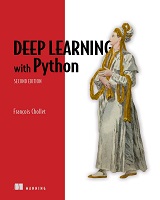
|
FreeComputerBooks.com
Links to Free Computer, Mathematics, Technical Books all over the World
|
|
- Title: Deep Learning with Python, Second Edition
- Author(s): Francois Chollet
- Publisher: Manning; 2nd edition (December 21, 2021)
- Permission: Free to read entire book online by the publisher (Manning), with limited time every day.
- Hardcover/Paperback: 504 pages (First Edition: 384 pages)
- eBook: HTML
- Language: English
- ISBN-10/ASIN: 1617296864 (First Edition: 1617294438)
- ISBN-13: 978-1617296864 (First Edition: 978-1617294433)
- Share This:

|
This book introduces the field of deep learning using Python and the powerful Keras library. In this revised and expanded new edition, Keras creator François Chollet offers insights for both novice and experienced machine learning practitioners. As you move through this book, you'll build your understanding through intuitive explanations, crisp color illustrations, and clear examples. You'll quickly pick up the skills you need to start developing deep-learning applications.
- Deep learning from first principles
- Image classification and image segmentation
- Timeseries forecasting
- Text classification and machine translation
- Text generation, neural style transfer, and image generation
- Full color printing throughout
The Book is for readers with intermediate Python skills. No previous experience with Keras, TensorFlow, or machine learning is required.
About the Authors- Francois Chollet is the author of Keras, one of the most widely used libraries for deep learning in Python. He has been working with deep neural networks since 2012. Francois is currently doing deep learning research at Google. He blogs about deep learning at blog.keras.io.
- Deep Learning
- Python Programming
- Machine Learning
- Artificial Intelligence
- Data Analysis and Data Mining

- Deep Learning with Python, 2nd Edition (Francois Chollet)
- The Mirror Site (1) - PDF
- The First Edition
- The Mirror Site (1) - PDF
- The Booke Homepage (Sample Capters, Source Code, etc.)
-
 Deep Learning in Python Prerequisites: Data Science and ML
Deep Learning in Python Prerequisites: Data Science and ML
This book was designed to contain all the prerequisite information you need for my next book, Deep Learning in Python: Master Data Science and Machine Learning with Modern Neural Networks written in Python, Theano, and TensorFlow.
-
 Deep Learning for Coders with Fastai and PyTorch
Deep Learning for Coders with Fastai and PyTorch
This book show you how to train a model on a wide range of tasks using fastai and PyTorch. You'll also dive progressively further into deep learning theory to gain a complete understanding of the algorithms behind the scenes.
-
 Deep Learning with PyTorch (Eli Stevens, et al.)
Deep Learning with PyTorch (Eli Stevens, et al.)
This book teaches you to create deep learning and neural network systems with PyTorch. It gets you to work right away building a tumor image classifier from scratch. You'll learn best practices for the entire deep learning pipeline, tackling advanced projects.
-
 Python Machine Learning Projects (Brian Boucheron, et al)
Python Machine Learning Projects (Brian Boucheron, et al)
This book tries to equip the developers of today and tomorrow with tools they can use to better understand, evaluate, and shape machine learning. If you know some Python and you want to use machine learning and deep learning, pick up this book.
-
 Deep Learning with JavaScript: Neural Networks in TensorFlow.js
Deep Learning with JavaScript: Neural Networks in TensorFlow.js
This book shows developers how they can bring Deep Learning technology to the web. Written by the main authors of the TensorFlow library, it provides fascinating use cases and in-depth instruction for deep learning apps in JavaScript in your browser or on Node.
-
 Neural Networks and Deep Learning (Michael Nielsen)
Neural Networks and Deep Learning (Michael Nielsen)
Neural networks and deep learning currently provide the best solutions to many problems in image recognition, speech recognition, and natural language processing. This book will teach you the core concepts behind neural networks and deep learning.
-
 Deep Learning (Ian Goodfellow, et al)
Deep Learning (Ian Goodfellow, et al)
Written by three experts, this is the only comprehensive book on the subject. It offers mathematical and conceptual background, covering relevant concepts in linear algebra, probability theory and information theory, numerical computation, and machine learning.
-
 Learning Deep Architectures for AI (Yoshua Bengio)
Learning Deep Architectures for AI (Yoshua Bengio)
This book discusses the motivations for and principles of learning algorithms for deep architectures. By analyzing and comparing recent results with different learning algorithms for deep architectures, explanations for their success are proposed.
-
 Probabilistic Machine Learning: An Introduction (Kevin Murphy)
Probabilistic Machine Learning: An Introduction (Kevin Murphy)
This book is a comprehensive introduction to machine learning that uses probabilistic models and inference as a unifying approach. It is written in an informal, accessible style, complete with pseudo-code for the most important algorithms.





